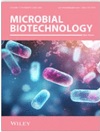Latest Publications
Coevolutionary analysis of Pseudomonas syringae–phage interactions to help with rational design of phage treatments
 Mojgan Rabiey, Emily R. Grace, Paulina Pawlos, Muscab Bihi, Haleem Ahmed, Georgina E. Hampson, Amna Al Riyami, Leena Alharbi, Rosa Sanchez-Lucas, Naina Korotania, Maria Laura Ciusa, Olivia Mosley, Michelle T. Hulin, Laura Baxter, Sabrine Dhaouadi, Diana Vinchira-Villarraga, Robert W. Jacks
Mojgan Rabiey, Emily R. Grace, Paulina Pawlos, Muscab Bihi, Haleem Ahmed, Georgina E. Hampson, Amna Al Riyami, Leena Alharbi, Rosa Sanchez-Lucas, Naina Korotania, Maria Laura Ciusa, Olivia Mosley, Michelle T. Hulin, Laura Baxter, Sabrine Dhaouadi, Diana Vinchira-Villarraga, Robert W. Jacks
Pseudomonas syringae pathovar syringae (Pss) is a major pathogen of cherry (Prunus avium) causing bacterial canker of the stem, leaf and fruit, impacting productivity and leading to a loss of trees. In an attempt to find a treatment for this disease, naturally occurring bacteriophage (phage) that specifically target Pss is being investigated as a biocontrol strategy. However, before using them as a biocontrol treatment, it is important to both understand their efficacy in reducing the bacterial population and determine if the bacterial pathogens can evolve resistance to evade phage infection. To investigate this, killing curve assays of five MR phages targeting Pss showed that phage resistance rapidly emerges in vitro, even when using a cocktail of the five phages together. This study shows that understanding the genetic mechanisms of bacterial pathogen resistance to phages is important for helping to design a more effective approach to kill the bacteria while minimizing the opportunity for phage resistance to manifest.
